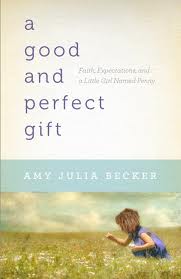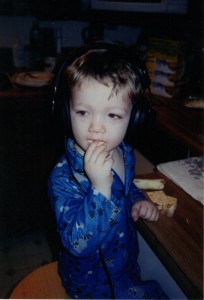 I recently discovered Amy Julia Becker, whose new book, “A Good and Perfect Gift”, is described as “a spiritual memoir that chronicles Amy Julia Becker’s journey through her daughter Penny’s first years of life. Top of her class at Princeton, Amy Julia Becker always imagined that her children would turn out just like her. So when her daughter Penny entered the world with Down syndrome, Becker had to rethink everything.”
I recently discovered Amy Julia Becker, whose new book, “A Good and Perfect Gift”, is described as “a spiritual memoir that chronicles Amy Julia Becker’s journey through her daughter Penny’s first years of life. Top of her class at Princeton, Amy Julia Becker always imagined that her children would turn out just like her. So when her daughter Penny entered the world with Down syndrome, Becker had to rethink everything.”
Needless to say, I was fascinated.
I haven’t had time to read the book yet, swamped in textbooks as I am, but this excerpt jumped out me–Amy Julia’s comment/question to her family shortly after giving birth to Penny.
“What I want to figure out is whether Down syndrome is a mistake,” I said. “I know that scientists and doctors would say that it is.” I gestured toward the papers on the table. “But how do I think about it in terms of God? Is it a manifestation of sin in the world? Is Penny less perfect than that little girl who was born next door?”
The room stayed silent…
How could she be a mistake?
I looked up when Mom spoke, in her gentle, level voice. “The only evidence of sin that I see in Penny’s birth is in how we respond to her.”
As the mom of a special needs child, this cuts straight to my heart. Now, at thirteen, when Jamison can join in on football and have sleepovers with his friends and spend hours tweaking graphics in Photoshop, would I trade my Jamison for a “non-autistic” model, a Jamison whose neuropathways function just like everyone else’s? Not on your life! I look at other kids his age, and see only blessings–Jamison has a sweetness and simplicity that his peers have long outgrown, the intellect of a young teen, paired with a guileless transparency that is anything but normal.
And yet, I remember years when this was not the case–when I would have given anything for Jamison to be “normal.” These were years characterized by screaming jags, by ceaseless self-stimulating sounds and motions, and by masterful, Houdini-like escapes that regularly threatened Jamison’s physical safety. These were years of exhaustion, terror, and trauma.
As I pondered Amy Julia’s reaction to her precious daughter, and similar statements I have heard from other special needs parents, I think I have discovered the difference between my grateful embrace of Jamison as he is now, and my “fight this disorder like the hordes of hell are after my baby” response of his early years. And the difference lies not so much in Jamison’s ability to know, but to be known.
 For years, I felt that my son was locked away from me–I described it as Jamison “being locked in a glass box.” Jamison couldn’t express what he was going through–what was tormenting him when he screamed for 30 minutes at a time, why he needed to pour Legos over his head or twist himself up in the curtains, what compelled him to jimmy locks and dash out into the street, or the church lobby, or the snowy roof of our garage (!!!). And it didn’t seem that he could understand or respond to what we were saying, either–although the lucidity of his memories of those years shocks me. It wasn’t until Jamison was four years old, and began responding to questions or comments with stock phrases he had picked up from television or computer games, that he could begin to converse, to express what was going on inside of him.
For years, I felt that my son was locked away from me–I described it as Jamison “being locked in a glass box.” Jamison couldn’t express what he was going through–what was tormenting him when he screamed for 30 minutes at a time, why he needed to pour Legos over his head or twist himself up in the curtains, what compelled him to jimmy locks and dash out into the street, or the church lobby, or the snowy roof of our garage (!!!). And it didn’t seem that he could understand or respond to what we were saying, either–although the lucidity of his memories of those years shocks me. It wasn’t until Jamison was four years old, and began responding to questions or comments with stock phrases he had picked up from television or computer games, that he could begin to converse, to express what was going on inside of him.
Certainly, every time a child turns out differently than we expected, there is a period of grieving. This is true whether we have a disabled child who will be unable to live a typical life, or just a child who veers off the path we envisioned for them–the bookworm born to the football coach, or the happy single who never marries or produces grandchildren. But most of us eventually come to grips with those differences, those significant and trivial disappointments, and wholeheartedly embrace our children for who they are.
This makes me wonder: perhaps the real horror of brain disorders is not the idea that something is wrong with our child. Perhaps it is the fear that what we see on the surface is not who they really are, not who they were created to be. Perhaps Downs syndrome children were born exactly as God intended, medical issues aside. I could see that. But how does that relate to the horror of a family who watches their teen descend into the confusion of schizophrenia, or the frustration of a child who is, in all essence, trapped inside his own body? It is one thing to be different. It is another to be unknown for who you truly are, to have your mental and spiritual uniqueness stifled or hidden by physical limitations or uncooperative brain chemistry.
Obviously, this is an issue I am still wrestling through, and not just in a removed, intellectual manner. If a handful of paragraphs from “A Good and Perfect Gift” could get me thinking this hard, I can’t imagine what the rest of the book will stir up in my soul. For me, these are the hard things to grapple with as a Christ-follower–it’s much easier to dive into books about theology than to try to apply it to the pain, grief, and brokenness of human existence. What seems crystal clear on paper can look impossibly blurry through eyes filled with blood, sweat, and tears.
That’s one of the reasons I’m so thankful for the incarnation–that God didn’t just send us a book, as wonderful as it is. That God sent us Himself, the new Adam, so we could learn how to live, and ultimately be redeemed from this mess we live in. At times, it’s a beautiful mess–a glorious mess, indeed. But it’s still a stinking mess.

9 Responses to Are Disabilities a Result of Sin? Special Needs, Fallen Nature, and Mommy-Grief